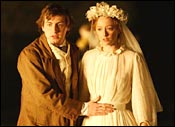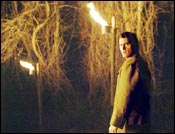 Head-scratching audiences have proved great for M Night Shyamalan, whose last three films -- The Sixth Sense, Unbreakable and Signs -- have grossed about $1.5 billion in movie theatres.
Head-scratching audiences have proved great for M Night Shyamalan, whose last three films -- The Sixth Sense, Unbreakable and Signs -- have grossed about $1.5 billion in movie theatres.
There would undoubtedly be heated discussion about his newest film, The Village. Like his previous films, there are enough ambiguous scenes in The Village for the audiences to try and figure out what exactly transpired.
But some viewers may resent that the visually stunning film has too many football field size plot holes. And that it is too much of a teaser.
| |||||||||||
Some reviewers have also started reading political messages in The Village, whose central character is Walker (William Hurt). They have immediately connected the character to the living one whose middle name too is Walker. These critics have called the film an allegory about how people can be manipulated to live under fear. Shyamalan, who has seldom discussed his politics, may be interested in reading the interpretations.
 Walker, in this film, is constantly telling the youngsters in his secluded community that they should not cross the woods so that the truce between the mysterious creatures in the woods and the community is not violated. The story takes place, we are reminded, in the year 1897.
Walker, in this film, is constantly telling the youngsters in his secluded community that they should not cross the woods so that the truce between the mysterious creatures in the woods and the community is not violated. The story takes place, we are reminded, in the year 1897. Hardly anyone seems to be curious about the other side except for a young man Lucius (Joaquin Phoenix), who wants to venture into the woods. But even as Lucius plans a journey, strange things start happening and he changes his mind. The only other person who has partly ventured into the woods is the simple-minded Noah (Adrien Brody), whose character undergoes a startling change when Ivy, the young woman he is after, is getting ready to marry Lucius.
When Lucius is badly wounded, and the chances of his living seem remote without medicine found in the towns beyond the woods, Ivy has to fight hard to convince her father to let her venture beyond the sacrosanct boundaries. The two young men who volunteer to accompany her change their mind soon after they get into the woods.
As Ivy fights her way through the woods, the film gains momentum. And Shyamalan does an excellent job of capturing her fears and inadequacies through the harrowing journey. Many of the shots captured from a high altitude are awesome but the camera never fails to register Ivy's emotions.
The scenes in the woods also produce one of the few jolting sequences, soon leading to a fairly surprising revelation.
 The revelation would lead the viewers to a lot of questions -- but it is hard to think of logical answers. Even films that purportedly deal with the supernatural cannot have too many farfetched happenings. But Shyamalan, who writes his own stories and scripts, is perhaps becoming oblivious to keeping such happenings to the minimum.
The revelation would lead the viewers to a lot of questions -- but it is hard to think of logical answers. Even films that purportedly deal with the supernatural cannot have too many farfetched happenings. But Shyamalan, who writes his own stories and scripts, is perhaps becoming oblivious to keeping such happenings to the minimum. Unlike Shyamalan's previous three films, The Village does not have a star. But he has certainly put together a strong ensemble cast. However, most of them including Sigourney Weaver, who plays Lucius' mother, are wasted. Brody, however, has quite a presence in the film. So does William Hurt, though we have seen him in better sketched roles.
However, Bryce Dallas Howard (left, above) is a natural actress who effectively brings out her anger, passion and love. It is the best-written role in the film and watching the actress emote under Shyamalan's direction is one of the few genuine pleasures of this muddled and overblown film.
CREDITS
Cast: Bryce Dallas Howard, William Hurt, Joaquin Phoenix, Adrien Brody, Sigourney Weaver
Story, direction: M Night Shyamalan
Running time: 105 minutes






 © 2025
© 2025